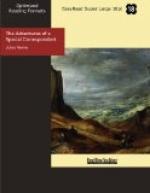“Take care, my dear pupil! That is a sort of pudding made of hashed meat mixed with fat and spices. I fear it may be heavy—”
“Then, doctor, I would advise you not to eat it. For my part, I will follow these gentlemen.”
And Pan Chao did—and rightly so, for the maintuy was delicious—while Doctor Tio-King contented himself with the lightest dish on the bill of fare. It appeared from what Major Noltitz said that these maintuys fried in fat are even more savory. And why should they not be, considering that they take the name of “zenbusis,” which signifies “women’s kisses?”
When Caterna heard this flattering phrase, he expressed his regret that zenbusis did not figure on the breakfast table. To which his wife replied by so tender a look that I ventured to say to him:
“You can find zenbusis elsewhere than in Central Asia, it seems to me.”
“Yes,” he replied, “they are to be met with wherever there are lovable women to make them.”
And Pan Chao added, with a laugh:
“And it is again at Paris that they make them the best.”
He spoke like a man of experience, did my young Celestial.
I looked at Pan Chao; I admired him.
How he eats! What an appetite! Not of much use to him are the observations of the doctor on the immoderate consumption of his radical humidity.
The breakfast continued pleasantly. Conversation turned on the work of the Russians in Asia. Pan Chao seemed to me well posted up in their progress. Not only have they made the Transcaspian, but the Transsiberian, surveyed in 1888, is being made, and is already considerably advanced. For the first route through Iscim, Omsk, Tomsk, Krasnojarsk, Nijni-Ufimsk, and Irkutsk, a second route has been substituted more to the south, passing by Orenburg, Akmolinsk, Minoussinsk, Abatoni and Vladivostock. When these six thousand kilometres of rails are laid, Petersburg will be within six days of the Japan Sea. And this Transsiberian, which will exceed in length the Transcontinental of the United States, will cost no more than seven hundred and fifty millions.
It will be easily imagined that this conversation on the Russian enterprise is not very pleasing to Sir Francis Trevellyan. Although he says not a word and does not lift his eyes from the plate, his long face flushes a little.
“Well, gentlemen,” said I, “what we see is nothing to what our nephews will see. We are traveling to-day on the Grand Transasiatic. But what will it be when the Grand Transasiatic is in connection with the Grand Transafrican.”
“And how is Asia to be united by railway with Africa?” asked Major Noltitz.
“Through Russia, Turkey, Italy, France and Spain. Travelers will go from Pekin to the Cape of Good Hope without change of carriage.”
“And the Straits of Gibraltar?” asked Pan Chao.
At this Sir Francis Trevellyan raised his ears.




